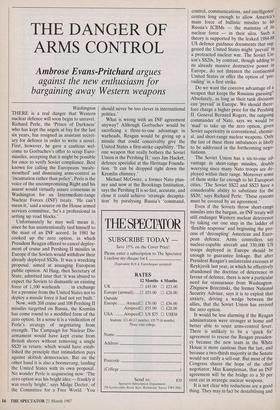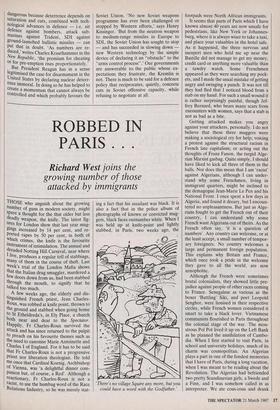THE DANGER OF ARMS CONTROL
Ambrose Evans-Pritchard argues
against the new enthusiasm for bargaining away Western weapons
Washington THERE is a real danger that Western nuclear defence will soon begin to unravel. Richard Perle, the 'Prince of Darkness' who has kept the angels at bay for the last six years, has resigned as assistant secret- ary for defence in order to write a novel. First, however, he gave a cautious wel- come to Gorbachev's offer to scrap Euro- missiles, accepting that it might be possible for once to verify Soviet compliance. Best known for calling the Europeans 'mealy- mouthed' and dismissing arms-control as `incantation rather than policy', Perle is the voice of the uncompromising Right and his assent would virtually assure consensus in Washington for an Intermediate-range Nuclear Forces (INF) treaty. `He can't mean it,' said a source on the House armed services committee, 'he's a professional in setting up road blocks.'
Unfortunately he may well mean it, since he has unintentionally tied himself to the mast of an INF accord. In 1981 he cooked up the zero option, in which President Reagan offered to cancel deploy- ment of cruise and Pershing II missiles in Europe if the Soviets would withdraw their already deployed SS20s. It was a wrecking proposal, aimed at assuaging European public opinion. Al Haig, then Secretary of State, admitted later that `it was absurd to expect the Soviets to dismantle an existing force of 1,100 warheads . . . in exchange for a promise from the United States not to deploy a missile force it had not yet built.'
Now, with 208 cruise and 108 Pershing II missiles targetted on Russia, the Kremlin has come round to a modified form of the zero option. In a sense it is a vindication of Perle's strategy of negotiating from strength. The Campaign for Nuclear Dis- armament would have kept cruise from British shores without removing a single SS20 in return, which would have estab- lished the principle that intimidation pays against skittish democracies. But on the other hand it is also a boomerang, landing the United States with its own proposal. No wonder Perle is acquiescing now: `The zero option was his bright idea — frankly it was overly bright,' says Midge Decter, of the Committee for a Free World. 'You should never be too clever in international politics.'
What is wrong with an INF agreement anyway? Although Gorbachev would be sacrificing a three-to-one advantage in warheads, Reagan would be giving up a missile that could conceivably give the United States a first-strike capability. 'The one weapon that really bothers the Soviet Union is the Pershing II,' says Jim Hacker, defence specialist at the Heritage Founda- tion. `It can be dropped right down the Kremlin chimney.'
Michael McGwire, a former Nato plan- ner and now at the Brookings Institution, says the Pershing II is so fast, accurate, and close it could achieve `strategic decapita- tion' by paralysing Russia's `command, control, communications, and intelligence' centres long enough to allow America's main force of ballistic missiles to hit Russia's ICBMs — the mainstay of its nuclear force — in their silos. Such a theory is supported by the leaked 1984-88 US defence guidance documents that sug- gested the United States might 'prevail' in a protracted nuclear war. The Soviet Un- ion's SS20s, by contrast, though adding to its already massive destructive power in Europe, do not threaten the continental United States or offer the option of 'pre- vailing' in a first strike.
Do we want the coercive advantage of a weapon that keeps the Russians guessing? Absolutely, as long as their tank divisions can `prevail' in Europe. We should there- fore charge a higher price for the Pershing II. General Bernard Rogers, the outgoing commander of Nato, says we would be `mad' to take up the zero option, given Soviet superiority in conventional, chemic- al, and short-range nuclear weapons. Only the last of these three imbalances is likely to be addressed in the forthcoming nego- tiations.
The Soviet Union has a six-to-one ad- vantage in short-range missiles, doubly worrying since many Nato troops are de- ployed within their range. Moreover some of them strike far enough to hit European cities. `The Soviet SS22 and SS23 have a considerable ability to substitute for the SS20,' says Richard Perle. `These systems must be covered by an agreement.'
Even if the Soviets throw short-range missiles into the bargain, an INF treaty will still endanger Western nuclear deterrence by taking out one step in the ladder of `flexible response' and beginning the pro- cess of `decoupling' American and Euro- pean defence. Arms controllers say nuclear-capable aircraft and 330,000 US troops deployed in Europe should be enough to guarantee linkage. But after President Reagan's unilateralist excesses at Reykjavik last year, in which he effectively abandoned the doctrine of deterrence in favour of defence, there is now a particular need for reassurance from Washington. Zbigniew Brzezinski, the former National Security Adviser, says it is to exploit that anxiety, driving a wedge between the allies, that the Soviet Union has revived the zero option.
It would be less alarming if the Reagan adminstration were stronger at home and better able to resist arms-control fever. There is unlikely to be a `quick fix' agreement to rescue the Reagan presiden- cy because the new team in the White House is more cautious than the last, and because a two-thirds majority in the Senate would not ratify a sell-out. But most of the Congress shares the hope of the chief negotiator, Max Kampleman, that an INF agreement will be the bridge to a 50 per cent cut in strategic nuclear weapons.
It is not clear why reductions are a good thing. They may in fact be destabilising and dangerous because deterrence depends on saturation and cuts, combined with tech- nological advances in defence — i.e. air defence against bombers, attack sub- marines against Trident, SDI against ground-launched ballistic missiles — can put that in doubt. 'As numbers are re- duced,' writes Charles Krauthammer in the New Republic, 'the premium for cheating or for pre-emption rises proportionately.' But President Reagan has in a sense legitimised the case for disarmament in the United States by declaring nuclear deterr- ence immoral. In doing so he has helped to create a momentum that cannot always be controlled and which probably favours the Soviet Union. 'No new Soviet weapons programme has ever been challenged or stopped by Western efforts,' says Henry Kissinger. 'But from the neutron weapon to medium-range missiles in Europe to SDI, the Soviet Union has sought to stop — and has succeeded in slowing down new Western technology by the simple device of declaring it an "obstacle" to the "arms control process".' Our governments are answerable to- the public whose ex- pectations they frustrate, the Kremlin is not. There is much to be said for a defence policy that reciprocates, quietly, concrete cuts in Soviet offensive capacity, while refusing to negotiate at all.



















































 Previous page
Previous page